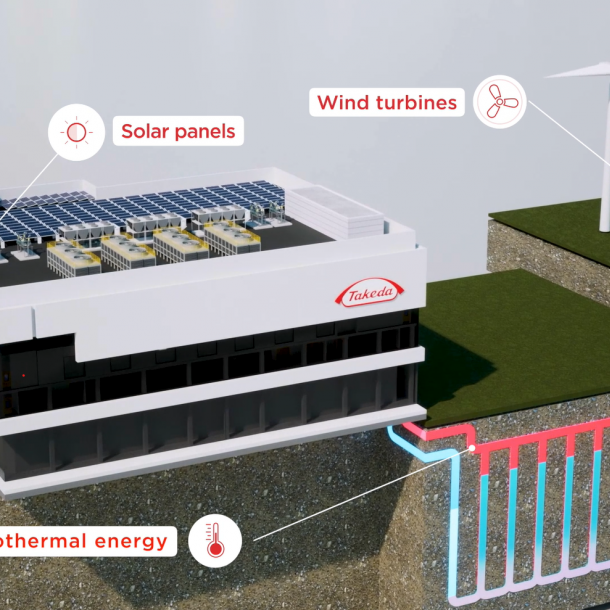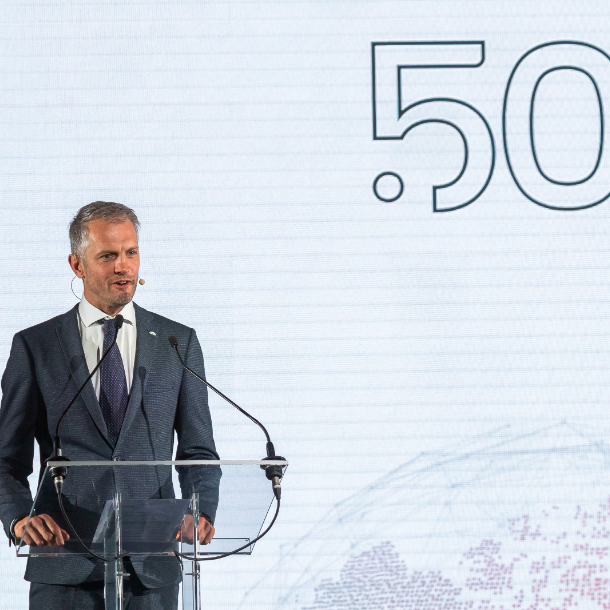A record-breaking investment of €300 million by the Japanese TAKEDA group in Lessines, with a view to establishing a new production line for plasma-based therapies.
On the 50th anniversary of its site in early September, the Takeda group announced its decision to invest €300 million in its Lessines plant, in order to establish a new production line to manufacture plasma-based therapies. These therapies are targeted at individuals with rare and complex chronic illnesses. At the same time, the group announced that an automated and fully digitised warehouse would also be built in Lessines. These two investments will have net-zero carbon emissions once they have been commissioned. The announced investment is the largest by the Takeda group in Belgium to date.

TAKEDA's DNA in Lessines
For the past 50 years, Takeda Belgium’s main activities have involved developing plasma-based treatments for patients suffering from rare diseases and complex chronic illnesses. With over 1,200 people employed from 23 different countries, the Walloon subsidiary is Takeda’s 3rd largest production site in the world today, after Japan and the United States. The new unit is replacing an old line, which has since become obsolete, and triples its production. As a result, the investment is of strategic importance for Lessines. It confirms Takeda’s great commitment to the Walloon site, which will also become the first site belonging to the Japanese giant to reuse 90% of its waste water by 2023.
In September 2021, the Japanese group had already inaugurated a new production unit for plasma-based therapies. This involved an investment of €118 million. The Lessines site was again able to distinguish itself from internal competition thanks to its major experience in these kinds of treatments, which is linked to a long 50-year history in this sector. Additionally, the site’s performance in terms of energy and the environment also benefited it.
A patient-oriented approach
More specifically, the new production unit is a purification line for antibodies, which are derived from human plasma. These are used to treat rare illnesses, such as primary or acquired immunodeficiency, which is a very difficult illness to detect. The Lessines site specialises in purifying and filling plasma-based therapies and is able to package several plasma-based treatments. Thanks to this new ultra-modern line, the production capacity of the Takeda Lessines site will be able to provide treatments for more than 300,000 immunocompromised patients, improving and extending their life expectancy.
Sustainability
The new production unit is also accompanied by a brand-new fully automated and carbon-neutral warehouse. The plant is already energy efficient, thanks to nearly 8,000 solar panels which cover 50% of its electricity needs, and will further improve its renewable resources through the addition of a wind turbine and geothermal resources. The major investment that has been announced will increase the digitisation of the group’s plants, with innovation playing a key role in the creation of a sustainable production environment. Water recycling will make it possible to reuse 90% of fresh water in the production process within a year, compared to 60% today, and to achieve electrical autonomy immediately afterwards. This data is particularly important in light of the current energy crisis in Europe. The necessary property expansions will be ready within the next nine months. The new warehouse will be operational next summer. The new line will begin production at the end of 2026. While this will not lead to job creation in the immediate future, the investment will nevertheless serve to sustain activities on the site and significantly increase production capacity, thanks to the new plant.
Geoffrey POT, General Manager of Operations at Takeda and President of Bio.be/essenscia
‘There is very good collaboration with the different governments in Belgium: federal, regional and local. Furthermore, our biotech ecosystem, which is truly unlike any other in the world, makes our country very attractive for investors. We are particularly proud and happy to have been able to announce Takeda’s largest investment to date in our Lessines site, thanks to the support of governments and public institutions such as AWEX.’

A welcome investment
The political world was out in force at the 50th anniversary event of the Lessines site. The announcement of the €300 million investment was welcomed by Hadja Lahbib, Minister of Foreign Affairs, European Affairs and Foreign Trade, David Clarinval, Minister of the Middle Class, SMEs and Self-employed, and Thomas Dermine, State Secretary for Science Policy, Recovery Program and Strategic Investments, who defined the pharmaceutical sector as one of the strategic hubs in his economic relaunch plan. Walloon Minister of the Economy, Willy Borsus, noted that 49% of R&D expenditure in Wallonia comes from the pharmaceutical sector, which demonstrates the importance and strategic nature of this sector.
For its part, Takeda is confirming the importance of Belgium as a long-term strategic production site for the manufacture and global distribution of plasma-based therapies through this new investment and, as a result, is securing its business.
Indeed, Belgium is not lacking in advantages for investments of this nature. It is an open economy, in which 1/3 of the jobs in the private sector are linked to foreign trade. It is also a symbol of our excellence in the flourishing biopharma sector, which, as Mrs Lahbib noted, accounts for 40,000 direct and indirect qualified jobs in our country.
Wallonia: a home away from home
The Lessines site positions Wallonia not only as a major player in the pharmaceutical and life sciences sector, but also highlights the importance of the sustainable development of companies in our country, which is supported by our region. Wallonia represents a favourable environment for any global company that wishes to achieve the goals of financial profitability and climate transition in Europe, thanks to its regulations and political support.
The main reasons that inspired Takeda to choose Wallonia over other sites within the group include the highly developed ecosystem in the region (research, healthcare, federations, hospitals, etc.) and the long history that the group has with it.
Takeda was able to rely on significant support from the political world and was closely positioned to decision-makers, which greatly facilitated the company’s development.
Sustainability and the circular economy, which are priorities for the economic development of the region, were also taken into account. The company’s carbon-neutral goal and investments in wind turbines, solar panels and geothermal energy were planned in line with this. When it comes to managing waste, this is reflected in the waste-water recovery system implemented by the plant.
Furthermore, Takeda Belgium can rely on the incredible commitment of its employees, thanks to the sustainability of the business, the loyalty of the employees in question and the quality of the jobs offered. It should be remembered that the battle for talent in the sector is significant internationally. The company places workers at the centre of its concerns by focusing on quality of life and well-being in the workplace, for example, through rest areas and the site's vegetable garden.
The Lessines site is also riding the wave of digitisation that has been supported by politicians in Wallonia. Automation and data management make the site a truly futuristic plant.
Role of the Wallonia Export & Investment Agency (AWEX)
AWEX and Takeda have a long history. Business support from AWEX, in particular its regional centre in Mons, has helped the group in a number of ways throughout its development.
The Agency helped the group to prepare the argument it presented to its Board of Directors to convince them to continue investing in the Lessines site, in particular by confirming political support and support at different levels.
The Agency has established a specific task force for the Takeda project, in order to ensure targeted and multi-disciplinary support with the various projects presented to the administrations as part of its development. This personalised, bespoke support throughout the process was not a one-shot; it is maintained on a regular basis. The project was carried out in a team-management format, both in Wallonia (for more operational aspects) and Japan (more strategic aspects).
Takeda is a structuring figure within the biopharmaceutical ecosystem in Wallonia because of the 1,200 high-level jobs it creates directly and its leadership role, thanks to the extensive interaction it has with other players in the sector.
The Belgian subsidiary’s goal of carbon neutrality by 2030 makes it a spearhead within the group and a trailblazing company in Wallonia. AWEX has strongly supported its commitments towards the environment by assisting it continuously with various projects (wind farm, geothermal energy, recycling waste water, etc.).
A Walloon success story that makes us very proud!
